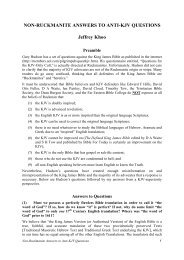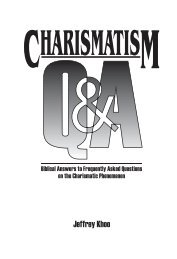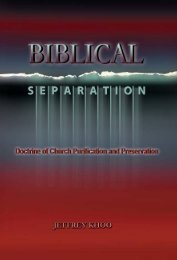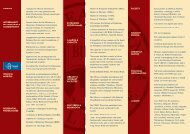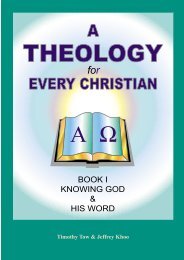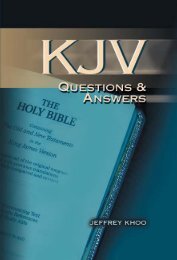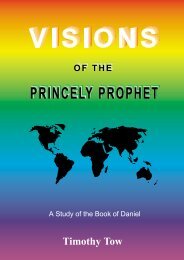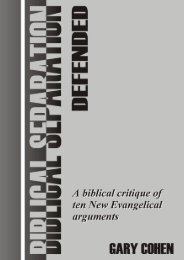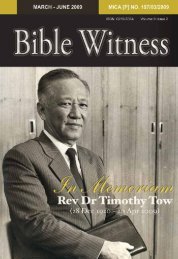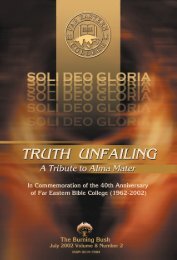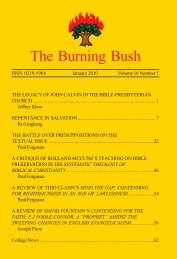50 Years Building His Kingdom - Far Eastern Bible College
50 Years Building His Kingdom - Far Eastern Bible College
50 Years Building His Kingdom - Far Eastern Bible College
Create successful ePaper yourself
Turn your PDF publications into a flip-book with our unique Google optimized e-Paper software.
8. “We do reject the method of interpreting the Scriptures that make the following claim:<br />
That one must use only verses that were written earlier than the <strong>Bible</strong> text being<br />
studied in order to shed light on its meaning, since using verses that are written at a<br />
later time to do this, would result in reading into the text.”<br />
a. This method of interpretation is Neo-evangelical and originated from Walter C.<br />
Kaiser, who calls it “the Analogy of Antecedent Scripture.” Using this, Kaiser<br />
made an erroneous interpretation of the prophecy of the virgin birth of Christ<br />
given in Isaiah 7:14, claiming that the child who was born miraculously in Ahaz’s<br />
lifetime was his son, Hezekiah, who became the next king of Judah. (The Promise<br />
Single-Meaning Hermeneutic, Evangelical Journal 6 [1988]: 55-70).) We believe<br />
that Matthew’s interpretation that the prophecy was fulfilled only in the birth of<br />
Jesus must be used to interpret Isaiah 7:14.<br />
9. “We do reject the teaching of Hyper-Calvinists that God loves only the elect, not the<br />
whole world (John 3:16), and claims that one cannot say to a whole crowd of sinners,<br />
“God loves you and wants you to live and not die,” since not all of them are elected to<br />
salvation.”<br />
a. Hyper-Calvinism is the term used to describe a distorted form of Calvinism that<br />
goes beyond what John Calvin himself has taught. It teaches that God hates all<br />
unbelievers, and works all things towards their destruction. Both Calvin and the<br />
Scriptures however, teach that God relates favourably to the non-elect in two<br />
ways:<br />
b. First, by the common grace that He shows to all men whether elect or non-elect.<br />
This common grace is seen in giving them gifts and talents, sunshine and rain, and<br />
time to repent of their sins. Consider Calvin’s words in his Institutes 2.2.14, “The<br />
power of human acuteness also appears in learning these [i.e. the arts] because<br />
all of us have a certain aptitude. ... Hence, with good reason we are compelled to<br />
confess that its beginning is inborn in human nature. Therefore this evidence clearly<br />
testifies to a universal apprehension of reason and understanding by nature<br />
implanted in men. Yet so universal is this good that every man ought to recognize<br />
for himself in it the peculiar grace of God.”<br />
c. Second, by sincerely inviting everyone, elect and non-elect, to repentance and<br />
salvation in Christ. In his commentary on John 3:16, “that whosoever believeth in<br />
him should not perish”, Calvin wrote, “The outstanding thing about faith is that it<br />
delivers us from eternal destruction. For He especially wanted to say that although<br />
we seem to have been born for death sure deliverance is offered to us by<br />
the faith of Christ so that we must not fear the death which otherwise threatens us.<br />
And he has used a general term, both to invite indiscriminately all to share in life<br />
and to cut off every excuse from unbelievers. Such is also significant in the term<br />
‘world’ which He had used before. For although there is nothing in the world<br />
deserving of God’s favour, He nevertheless shows He is favourable to the whole<br />
world when He calls all without exception to the faith of Christ, which is indeed<br />
an entry into life.”<br />
d. Hyper-Calvinists are unable to see how God can be gracious to all, and yet at the<br />
same time be gracious to some, and willing to save all when He has already willed<br />
that only the elect would be saved. To them, it is a contradiction that God Himself<br />
cannot reconcile. It must be stated that there is no contradiction in the gospel<br />
offer, and in the grace God shows to both the elect and reprobate. In order to<br />
properly understand those concepts we must distinguish God’s decretive will from<br />
<strong>His</strong> desiderative will as Calvin himself did.<br />
10. “We do believe in the biblical doctrine and practice of personal and ecclesiastical<br />
separation from all forms of unbelief and apostasy, viz., Romanism, Ecumenism, Modernism,<br />
Charismatism and Neo-evangelicalism.”<br />
Page 69




